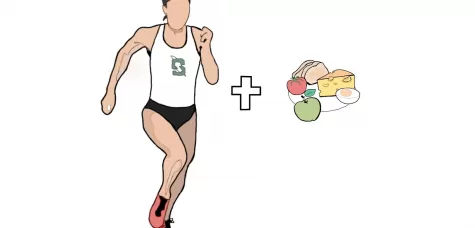New XC Coach Ensures Athletes are Healthy in Mind and Body: A Look at RED-S
The stereotypical daily routine of a cross country runner consists of eating oatmeal and running for an obscene amount of time, but what people don’t get to see is the behind the scenes of how much work goes into shaping a successful long distance runner.
As a runner on the Summit cross-country team, let me tell you- physical therapy has been my best friend. While that’s not the case for every runner, the importance of rolling out your muscles, stretching, fueling correctly, drinking enough water and so many other aspects are critical to performing to the best of your abilities.
This year, the Summit cross-country team gained a new head coach, Kari Strang. She has already found a way to successfully bring a fresh perspective to a renowned national championship team.
One of Strang’s main focuses throughout the season thus far has been bringing awareness to the dangers of underfueling. She has held talks with the team where she covers topics such as body positivity, the effect menstruation has on female runners and RED-S.
RED-S stands for Relative Energy Deficiency in Sport and affects many endurance and aesthetic athletes. RED-S occurs when there is a deficiency of consumed calories that are needed to balance the ones athletes’ burn during workouts and other daily activities.
“A lot of time the underfueling is not intentional,” Strang said. “People think that because they’re an athlete they need to have a perfect diet, so they go on a long run and then have a kale salad because that’s healthy. But what they don’t realize is that even though there are nutrients in a kale salad, they’re not replacing enough calories to counterbalance the energy expenditure of that long run.”
Underfueling takes an immense toll on the body. Menstruation is one of the biggest signs of RED-S among female athletes.
“It was once thought that missing or irregular periods were due to having a body fat percentage that was too low,” said Registered Dietician Megan Kuikman. “Rather, it is insufficient calorie intake. When not enough calories are being consumed, the body shuts down unnecessary processes that are not critical for survival.”
This calorie deficiency may result in infertility and missed or irregular periods.
Although RED-S affect’s menstruation among women, underfueling can affect men as well by lowering testosterone levels.
“Oftentimes male athletes don’t take in enough calories to perform at the level that they want to. It’s important to eat so that you’re fueling yourself properly in order to have good workouts and race well,” said senior Sam Hatfield, who joined Summit’s cross-country team his freshman year. “That extra awareness from Kari is helpful because now I know what I need to do in order to be successful.”
While RED-S is often unintentional, it can be a catalyst to developing a serious eating disorder. Contrary to what many people believe, at a certain point of a calorie deficit, the body does not lose weight anymore.
Strang compares metabolism to a bank account. If energy keeps being spent, eventually the body runs out of energy. In an attempt to not let the bank account run dry, the body holds on to the little food that has been consumed. As a protective mechanism, the metabolism slows down. Overtime, this means that the body isn’t losing weight anymore and thus can even result in weight gain.
“I have gotten a better perspective on my nutrition because I didn’t pay as much attention to that in the past couple years and it has really helped me to have a better relationship with food,” said junior and cross country athlete Maggie Williams. “I’ve begun viewing it as something that nurtures my body and as something I need in order to have energy to run, rather than judging how much I ate on a day-to-day basis.”
It’s important for role models, leaders and coaches like Strang, to open discussions about topics like body positivity. Today especially, as social pressures hold an immense influence on what the ideal body weight and type is for women and men.
“I think it’s really important that she [Kari Strang] addresses topics like this because body positivity has such a big impact on society right now. Her opening up to us shows that we have Kari as a support system and that she has the best interest for our physical and mental health.” said sophomore and cross country athlete Barrett Justema.
Knowing that Strang is just as much of a guiding hand as a coach gives the Summit cross-country athletes encouragement that the teams tradition of excellence in the world of running will continue.
“I want Cross Country to be more than just athletic performance. I want it to be about the whole person and where every person on the team feels valued and that they’re a part of something meaningful and they find a connection to running and find joy in that,” said Strang.
Some signs that you or someone you know may have RED-S:
- Low energy
- Recurring injuries/ colds
- Mood swings
- Feeling slow to recover
- Sleep disruption
- Trouble concentrating
- Missed/ irregular periods
- Low performance
Some long-term effects RED-S has on the body:



































